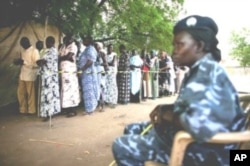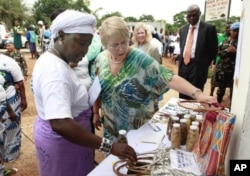This is Part 1 of a 5-part series on UN Women
Go to Part: 1 / 2 / 3 / 4 / 5
“Like a car without a driver.” That’s how U.N. official Lakshmi Puri described the organization’s efforts to handle women’s issues before the creation of UN Women. For years, global women’s issues were divided among four smaller entities – the best known being UNIFEM, the U.N. Development Fund for Women.
Puri, the new agency’s assistant secretary-general for intergovernmental support and strategic partnership, said today UN Women is behind the wheel.
“When I say a single driver,” she explained, “it means that [on the global level] we bring together inter-governmental… functions, setting standards, policies. [On the ground level], we have operational activities and actual projects to support gender equality and women’s empowerment.”
Goals
Puri said that empowerment is both political and economic. She said UN Women’s priorities also include “eliminating violence against women, promoting their participation in peace and security and enhancing their role in governance and their share in terms of gender response planning and budgeting.”
UN Women, said Puri, is especially keen to promote a women’s peace and security agenda. The agency encourages the participation of women as negotiators who can keep women’s issues front and center in talks to end conflict and in reconstruction efforts that follow and as part of the peacekeeping force.
Puri explained that UN Women is a “knowledge hub” of gender data, of analysis, of best practices and experiences.
It works to ensure women’s concerns are included in all parts of the United Nations. It also supports inter-governmental bodies like the Commission on the Status of Women in formulating global standards and norms. And, it helps member states implement those standards.
Working with UN member states
Puri said UN Women is working with members on all levels – national, regional and global.
“At the global level,” Puri says, “we have an inter-governmental forum where UN Women supports standard-setting in the area of gender equality. At the regional level, we will be working with member states and with regional organizations to set regional standards and regional programs. At the national level, we will be helping countries to establish a national gender machinery.”
Member states are partners in furthering women’s equality and empowerment.
They are also part of a 41-member board that governs UN Women. Six are named from various donors, including the United States, Britain, Mexico and Saudi Arabia. The rest are chosen by region, with 10 each from Africa and Asia, four from Eastern Europe, six from Latin America and the Caribbean and five from Western Europe.
Among the elected African members of the board are Angola, Cape Verde, Congo, Ivory Coast, Democratic Republic of the Congo, Ethiopia, Lesotho, Libya, Nigeria and Tanzania.
Also partnering with UN Women are national and international non-governmental organizations, which Puri said have been among the strongest advocates for creating the agency.
Among them are 300 international women’s and human rights groups of the GEAR (Global Equality Architecture Reform) campaign. Others include the Britain-based supporters called Godmothers of UN Women (http://www.thegodmothers.org.uk/), as well as women organizations in Africa and other parts of the world.
At what cost?
UN Women’s success depends on availability of resources and financial support. Member states have agreed to provide the new entity with an initial minimum budget of at least $500 million a year. That’s double the combined budget of the four earlier UN women’s agencies.
“By establishing UN Women, countries have strongly committed to support gender equality and to invest in it,” said Puri. Major donors to UN Women include Canada, Norway, Australia Denmark, and the Netherlands.
She said even emerging countries like South Korea and India have pledged substantial amounts. The agency is also seeking funding from foundations and private corporations.
“We are an organization that will have universal coverage,” said Puri. The agency’s presence will be “strategic… based on need and demand.”





